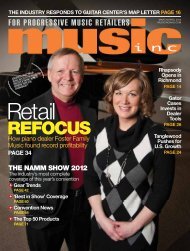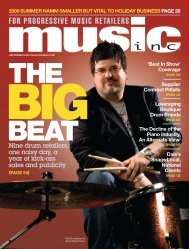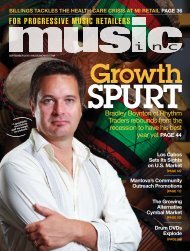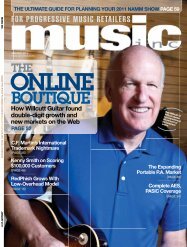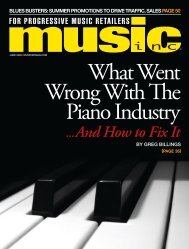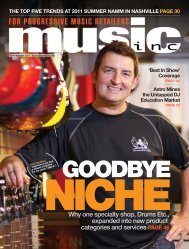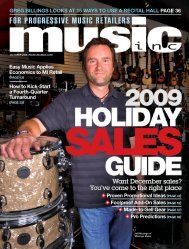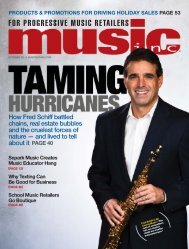Create successful ePaper yourself
Turn your PDF publications into a flip-book with our unique Google optimized e-Paper software.
{DAVIDAND<strong>GOLIATH</strong>}<br />
people at Jordan Kitt’s have<br />
been quite civil and cordial.”<br />
TLC & PIANO RETAIL<br />
But the best timing in the<br />
world would’ve meant<br />
nothing if not for sound business<br />
practices. Year after year,<br />
Slan’s stores have earned a<br />
healthy profit, many times<br />
while the rest of the piano<br />
industry has languished. Here,<br />
every piano retailer could take<br />
a page from his playbook.<br />
To start with, Slan is<br />
obsessed with TLC. Before he<br />
even considered the D.C.<br />
opportunity, he held phone<br />
interviews with local piano<br />
technicians to gauge their levels<br />
of expertise. Scoring famed<br />
piano technician Rick Butler<br />
helped seal the deal.<br />
Slan considers meticulous<br />
preparation critical to selling<br />
Steinways and bemoans how<br />
many piano retailers “do the<br />
absolute least amount of service<br />
and the absolute least expensive<br />
job that you can to make a<br />
piano acceptable to put on the<br />
floor.” He said he has found<br />
that the best technicians are<br />
usually independent. “And even<br />
though they are more expensive<br />
than lesser-quality technicians,<br />
because we use them only when<br />
they are needed, we save the<br />
company money.”<br />
It sounds ridiculously simple,<br />
but as Slan pointed out,<br />
Steinway retailers “only get<br />
one chance with a discerning<br />
concert pianist. They’re going<br />
to sit down, and if the piano<br />
doesn’t sound and play just<br />
right, you’ve lost them.”<br />
“When we compared our<br />
total operating expenses in [a<br />
piano retail sharing group], my<br />
expenses as a percentage of<br />
sales were always the lowest of<br />
the entire group — by maybe 5<br />
or 6 percentage points — but<br />
my service expense was always<br />
the highest. What I’m doing is<br />
54 I MUSIC INC. I JUNE 2010<br />
Slan keeps a<br />
high level of<br />
equity in his<br />
company to<br />
cushion it in<br />
tough times<br />
putting my money where it<br />
will have the biggest impact on<br />
my customers.”<br />
“David treats every customer<br />
as if [he or she is] purchasing<br />
a Steinway Concert<br />
Grand,” Losby said. “He never<br />
forgets from whom his success<br />
has come.”<br />
HIGH EQUITY, LOW DEBT<br />
Slan’s fiscal conservatism<br />
also helped spare him from<br />
the brunt of the piano market’s<br />
downturn. While he’ll splurge<br />
on service and payroll, he’ll<br />
often pore over each column<br />
on a profit and loss statement<br />
to find ways to reduce expenses<br />
without sacrificing quality.<br />
“The difference is we do that<br />
in bad times and good times.”<br />
He doesn’t floor plan. He<br />
pays cash for inventory, helping<br />
him get what he called “a very<br />
low rate and very favorable<br />
terms” when he has needed to<br />
borrow money. This also lets<br />
him take advantage of discounts<br />
from suppliers. And he said he<br />
keeps a higher level of equity in<br />
his company than most piano<br />
stores. In doing so, he sacrifices<br />
a higher return on his investment<br />
but cushions his company<br />
from market fluctuations.<br />
“There are some [retailers]<br />
who feel very comfortable with<br />
a lot of leverage in their company,”<br />
Slan said. “The problem<br />
is, whenever you have an economic<br />
downturn like we had<br />
and things get a little shaky,<br />
your floor plan companies,<br />
banks and suppliers all get<br />
nervous. With me, nobody got<br />
nervous.<br />
“When economic conditions<br />
are good, we do very<br />
well, and when business conditions<br />
are more difficult, our<br />
company is still profitable.”<br />
To other dealers, he recommended<br />
that they pay as close<br />
attention to their balance sheets<br />
as they do their sales figures.<br />
“Just selling another piano may<br />
not always be the most profitable<br />
thing to do,” he said. “To<br />
run your company effectively,<br />
you need to understand and<br />
manage your balance sheet. For<br />
example, what should my debtto-equity<br />
ratio be? How much<br />
inventory should I have to create<br />
the desired inventory turn?<br />
How much equity do I need to<br />
support my inventory and<br />
financing needs and allow me<br />
to borrow money under favorable<br />
terms?”<br />
Slan learned which ratios<br />
worked best for a dealership of<br />
his size by studying other<br />
companies in retail sharing<br />
groups. And he credited Bill<br />
McCormick, the late president<br />
of Jordan Kitt’s, as a key mentor<br />
in teaching him the financial<br />
side of the piano business.<br />
MARKETING TO THE INFLUENTIAL<br />
One interesting fact about<br />
the D.C. and St. Louis<br />
Steinway dealerships: They do<br />
very little traditional advertising.<br />
Prior to the D.C. store’s<br />
grand opening, Slan took out<br />
four ads in The Washington<br />
Post and later bought a set of<br />
ads for the Thanksgiving weekend.<br />
That’s it.<br />
In place of traditional publicity<br />
vehicles, he and his staff<br />
network endlessly. Courting<br />
centers of community influ-





